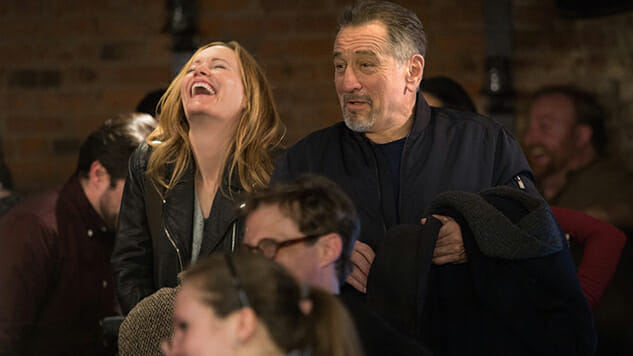Introducing Endless Mode: A New Games & Anime Site from Paste
Robert De Niro, are you OK? We get it, you’ve aged. But you don’t always have to be the rapping granny of lapsed actors, in boring films as a ubiquitous, lazy gag.
Because such is the case with Taylor Hackford’s The Comedian, which provides a warped sideshow reflection of De Niro’s role as comic in The King of Comedy, wherein his stand-up protagonist isn’t psychotic, he’s just an asshole. De Niro’s Jackie Burke—a BoJack Horseman-like figure of nostalgic cable imprisonment—is a struggling club comedian trying to reinvent his image. He was a popular character on a very famous TV show who now seems alone, discarded and empty, while his recognizable husk attracts both those living in the past and entrepreneurial vultures looking to bank on his waning celebrity for a quick buck.
Two of these artistic scavengers attempt to hijack one of Burke’s sloppy and tired insult routines—provided by co-writer and New York Friars Club (where a portion of the film takes place) “Roastmaster General” Jeff Ross—to feature in their web series focused on taking down bad stand-up. You’d think a comedian whose jokes solely revolve around putting people down would be able to feed off this crowd work, but Burke angers quickly. The ensuing brawl and subsequent hackneyed jokes at the assault trial (during which Burke implies that the man he assaulted couldn’t have suffered brain damage as he isn’t sure that the man has a brain—zing) land Burke with 100 hours of community service and 30 days in jail. Hackford never positions him as an antihero whose wounds cause him to act out, nor as a complete villain a la BoJack. He’s just a nebulous wave of vulgarity, the disembodied voice of a pubescent videogamer jammed into a desiccated actor.
Nevertheless, after haranguing family members for money and making dick jokes for the pleasure of the homeless at his court-mandated soup kitchen volunteer stint, Burke meets a girl. Harmony, a character as flat as Leslie Mann’s delivery, is immediately enamored with this geriatric’s jibes. She’s in the middle of a minor tiff with her father (Harvey Keitel, actually gleeful in his obnoxiousness and three years older than De Niro) so in a fit, mixing both father issues and poor taste, she decides to date the 30-years-her-senior Burke.
None of the film’s four writers seems to understand why stand-up movies can be interesting, choosing to make Burke the kind of performer who’s not only always “on” but entirely on the nose. Several actual comedians make cameos, including the very funny Hannibal Buress and Sheng Wang. Their bits, taken from their actual routines, provide brief oases of humor in the film’s vast and arid roast of its own audience. But any presumptions of nuance disappear when your film opens with the insult comedian protagonist playing a show in Hicksville. Any hypocrisy in the character remains unexamined, Burke’s loathing of his celebrity status melting away when it helps him get laid. There’s no focus on this, just the constant shuffle towards new microphones to put De Niro behind.
A lesbian wedding speech, an intensely telegraphed roast with an ill-fated end and an unwatchable sing-a-long parody of “Makin’ Whoopee” (“Makin’ Poopy”) in a nursing home—all microphones fall to De Niro. Though this is perhaps the most embarrassing thing De Niro has ever done, there’s no confusion about whether we’re supposed to think his tepid performances are misguided: His unsung comic stardom is part of the fantasy the film is selling.
The Comedian is all fantasy, an aging comedian daydream wherein sleaziness is as glorified as the film’s heavily stylized New York setting. A lounge jazz soundtrack and glossily shot streets push the neon on an audience desperate for vibrancy. It’s not a bad looking film, but its romanticized urbanity only distances its mish-mash of jumbled themes. We’re unsure if we’re supposed to embrace the city and its lovable vulgarity as a facet of Jackie Burke’s personality or interpret its unreal lights, drinks and constant audiences as a cage Burke needs to escape.
There’s a smug sense of righteousness underlying the movie—it’s an I, Daniel Blake for the politically correct generation. Except nobody’s offended here. The movie is filled with receptive audiences, welcoming unimaginative crassness with open arms. Burke becomes the subject of many viral videos which, when written by people who don’t understand the internet, means his career is revitalized and he’s certain to be back on top. When not focusing on Burke’s sad stand-up, we shift to his creepy personal life. It’s a depressing double-edged sword, yet the tone never wavers. The film is unwaveringly proud of Burke for sticking to his insulting guns, getting the girl (ew) and winning over his family by refusing to grow or learn.
Director: Taylor Hackford
Writer: Art Linson, Jeff Ross, Richard LaGravenese, Lewis Friedman
Starring: Robert De Niro, Leslie Mann, Danny DeVito, Harvey Keitel
Release Date: February 3, 2017
